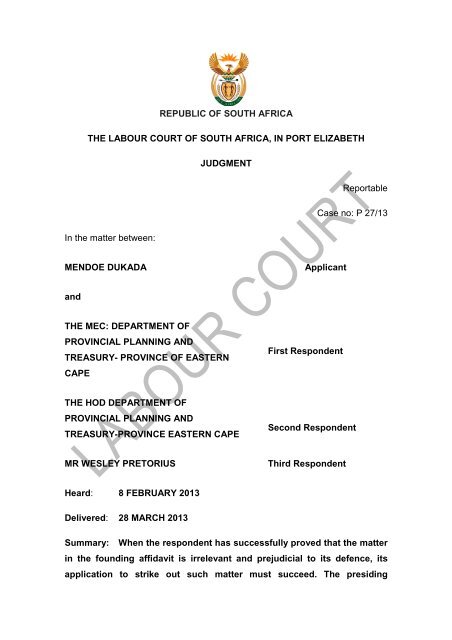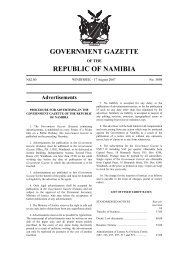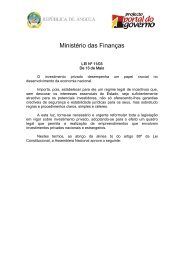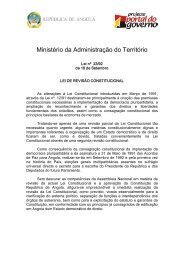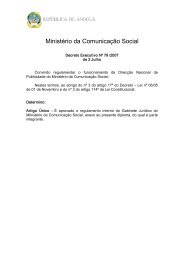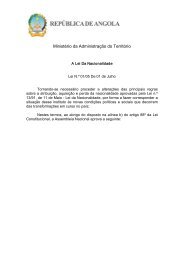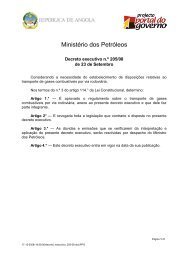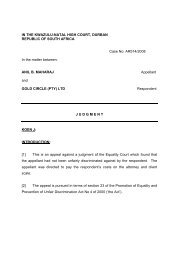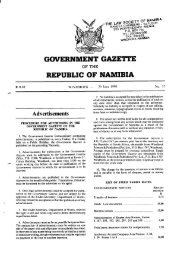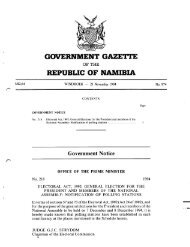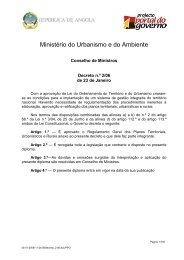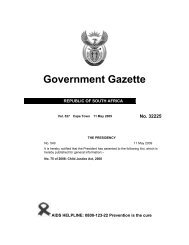Dukuda v MEC Department of Provincial Planning and Treasury ...
Dukuda v MEC Department of Provincial Planning and Treasury ...
Dukuda v MEC Department of Provincial Planning and Treasury ...
Create successful ePaper yourself
Turn your PDF publications into a flip-book with our unique Google optimized e-Paper software.
REPUBLIC OF SOUTH AFRICA<br />
THE LABOUR COURT OF SOUTH AFRICA, IN PORT ELIZABETH<br />
JUDGMENT<br />
Reportable<br />
Case no: P 27/13<br />
In the matter between:<br />
MENDOE DUKADA<br />
Applicant<br />
<strong>and</strong><br />
THE <strong>MEC</strong>: DEPARTMENT OF<br />
PROVINCIAL PLANNING AND<br />
TREASURY- PROVINCE OF EASTERN<br />
CAPE<br />
First Respondent<br />
THE HOD DEPARTMENT OF<br />
PROVINCIAL PLANNING AND<br />
TREASURY-PROVINCE EASTERN CAPE<br />
Second Respondent<br />
MR WESLEY PRETORIUS<br />
Third Respondent<br />
Heard: 8 FEBRUARY 2013<br />
Delivered: 28 MARCH 2013<br />
Summary: When the respondent has successfully proved that the matter<br />
in the founding affidavit is irrelevant <strong>and</strong> prejudicial to its defence, its<br />
application to strike out such matter must succeed. The presiding
2<br />
<strong>of</strong>ficer’s failure to find a competent representative for the <strong>Department</strong><br />
inside <strong>and</strong> outside the civil service who is not a legal practitioner is a<br />
manifestation <strong>of</strong> his failure to apply his mind <strong>and</strong> renders such decision<br />
reviewable.<br />
JUDGMENT<br />
LALLIE, J<br />
Introduction<br />
[1] This application was brought on an urgent basis for an order reviewing<br />
<strong>and</strong> setting aside the ruling <strong>of</strong> the third respondent in which he granted<br />
the <strong>Department</strong> <strong>of</strong> <strong>Provincial</strong> <strong>Planning</strong> <strong>and</strong> <strong>Treasury</strong> <strong>of</strong> the Eastern Cape<br />
(the <strong>Department</strong>) <strong>and</strong> the applicant leave to be legally represented in a<br />
disciplinary enquiry investigating allegations <strong>of</strong> misconduct against the<br />
applicant.<br />
Background Facts<br />
[2] The applicant is employed as Deputy Director General: Assets <strong>and</strong><br />
Liability Management at the <strong>Department</strong>. The finances <strong>of</strong> the Eastern<br />
Cape Province (the Province) are her main responsibility. The applicant<br />
was placed under precautionary suspension on 20 September 2012<br />
pending the finalisation <strong>of</strong> the investigation into alleged acts <strong>of</strong><br />
misconduct levelled against her<br />
[3] In the notice <strong>of</strong> intention to suspend the applicant she was informed that<br />
the reason for her suspension was gross insubordination for her alleged<br />
refusal to obey a lawful <strong>and</strong> reasonable instruction <strong>of</strong> the <strong>Provincial</strong><br />
Coordinating Monitoring Team (PCMT) committee <strong>and</strong>/or Superintendent<br />
General for <strong>Provincial</strong> <strong>Treasury</strong> for her deliberate failure to process the<br />
appointment <strong>of</strong> doctors. On 15 November 2012 the applicant was served<br />
with a notice <strong>of</strong> disciplinary hearing containing the following charges:<br />
‘3.1 Charge 1
3<br />
Gross insubordination in that on or about 5 September 2012 you<br />
deliberately refused to obey lawful <strong>and</strong> reasonable instructions <strong>of</strong> the<br />
Superintendent-General <strong>of</strong> <strong>Provincial</strong> <strong>Treasury</strong> <strong>and</strong>/or the PCMT<br />
Committee in that you failed to process the appointment <strong>of</strong> certain<br />
doctors, which appointments were duly authorised.<br />
In so doing your actions prejudiced the administration <strong>and</strong> efficiency <strong>of</strong><br />
the department <strong>and</strong> /or caused embarrassment to your employer.<br />
3.1 Charge 2<br />
Intimidation <strong>and</strong> /or victimisation <strong>of</strong> fellow members/employees, more<br />
particularly management <strong>and</strong> staff in programme 3 including conduct<br />
which displayed disrespect towards others in the workplace amounting<br />
to abusive <strong>and</strong> /or insolent behaviour, in that:<br />
3.1.1 You have repeatedly belittled managers in programme 3<br />
including chief directors, in management <strong>and</strong> other<br />
meetings, referring to such employees as “incompetent”<br />
<strong>and</strong>/or “useless” <strong>and</strong>/or lazy in the presence <strong>of</strong> their<br />
peers <strong>and</strong>/or subordinates.<br />
3.1.2 Forcing senior managers to agree to unrealistic <strong>and</strong><br />
unfair performance targets in their annual performance<br />
agreements <strong>and</strong> conducting unfair performance<br />
appraisals in the last formal assessment <strong>of</strong> such<br />
employees.<br />
3.1.3 Unnecessary <strong>and</strong>/or unwarranted <strong>and</strong>/or obstructive<br />
interference in the task, duties <strong>and</strong> outputs <strong>of</strong> managers<br />
in programme 3, more particularly by refusing to<br />
authorise necessary expenditure <strong>and</strong> /or constantly <strong>and</strong><br />
unnecessarily changing outputs <strong>and</strong> deliverables <strong>and</strong>/or<br />
instructing managers to perform task outside <strong>of</strong> their<br />
duties <strong>and</strong> the programme <strong>and</strong>/or preventing managers<br />
from interacting with stakeholders departments <strong>and</strong>/or<br />
refusing valid leave requests <strong>and</strong>/or taking away the<br />
decision making powers <strong>and</strong> functions <strong>of</strong> managers<br />
within the programme.
4<br />
3.3 Charge 3<br />
Displaying disrespect towards managers in other stakeholder<br />
departments <strong>and</strong>/or behaving in an unpr<strong>of</strong>essional manner thereby<br />
bringing the department into disrepute, (including complaints from the<br />
senior managers at the Eastern Cape <strong>Department</strong> <strong>of</strong> Health <strong>and</strong> its<br />
Head <strong>of</strong> <strong>Department</strong>)<br />
Incapacity<br />
Alternatively to charge 1,2 <strong>and</strong> 3 aforesaid it is alleged that you are<br />
unable to work in harmony with your colleagues <strong>and</strong>/or to fit into the<br />
employer’s corporate culture. In the circumstances it is alleged that this<br />
is an irremediable breakdown in the working relationship premised on<br />
incompatibility.’<br />
[4] The disciplinary enquiry with the third respondent as the chairperson sat<br />
on 20 November 2012. It was adjourned <strong>and</strong> reconvened on 14 January<br />
2013. The <strong>Department</strong> applied for legal representation. The application<br />
was opposed the applicant. On 22 January 2013 the third respondent<br />
issued a ruling in which he granted the <strong>Department</strong>’s application <strong>and</strong><br />
extended the right to be legally represented to the applicant. It is that<br />
ruling which is the subjects <strong>of</strong> this application.<br />
Application to strike out<br />
[5] The first <strong>and</strong> second respondents made an application to strike out<br />
certain paragraphs <strong>of</strong> the founding affidavit on the grounds that they are<br />
sc<strong>and</strong>alous <strong>and</strong> vexatious. The relevant paragraphs are the following:<br />
‘…will result in a protracted <strong>and</strong> exceedingly legalistic, forced <strong>and</strong><br />
artificial disciplinary case which will not be concerned with the simple<br />
question as to whether or not I have misconducted myself <strong>and</strong> if so,<br />
whether or not continued employment remains feasible. It is apparent<br />
that the instruction is to secure my dismissal at all costs <strong>and</strong> a legal<br />
team has been employed to give effect to that instruction. So much<br />
ought to be apparent from the following statement contained in the
5<br />
<strong>Department</strong>’s submissions in support <strong>of</strong> its application to be granted<br />
legal representation.<br />
Incompatibility is an extremely complex <strong>and</strong> developing concept <strong>and</strong><br />
technical expertise is required to establish its existence. Extensive <strong>and</strong><br />
effective consultation will be required with these witnesses <strong>and</strong> their<br />
evidence will have to lead (sic) by seasoned <strong>and</strong> experienced labour law<br />
practitioner in a coherent <strong>and</strong> orderly fashion, in order to link up the<br />
factual premise <strong>of</strong> the complaint to the applicable legal principle.<br />
5.1 Paragraph 10.5: In fact it is common cause (or at least it<br />
was not disputed), that such exposure to legal fees will in<br />
all probability be in the region <strong>of</strong> hundreds <strong>of</strong> thous<strong>and</strong>s<br />
<strong>of</strong> r<strong>and</strong>s. Given personal experience <strong>and</strong> the nature <strong>of</strong> my<br />
position within the government I also know that this is an<br />
objective fact;<br />
5.2 Paragraph 10.34: Should I appoint a reasonably<br />
“seasoned <strong>and</strong> experienced” legal representative (not a<br />
legal team as the <strong>Department</strong> did, I might add) to assist<br />
me in the meeting this is highly technical <strong>and</strong> (in my view)<br />
artificial case <strong>and</strong> in order to ensure that I receive a<br />
reasonably fair disciplinary hearing, I will inevitably be<br />
exposed to massive legal costs.<br />
5.3 Paragraph 15: It should immediately be noted that in a<br />
province where a financial control is notoriously poor <strong>and</strong><br />
where there is an unfortunate tendency to incur financial<br />
debt contrary to the law I <strong>of</strong>ten find myself in conflict with<br />
<strong>of</strong>ficial <strong>and</strong>/or politicians in executing my primary function,<br />
i.e. ensuring that proper financial control is maintained in<br />
accordance with the law.<br />
5.4 Paragraph 16: Unfortunately it should also be noted that<br />
in a rampant culture <strong>of</strong> corruption <strong>and</strong> self-enrichment<br />
there are many individuals who consider it as an obstacle<br />
to their personal agendas that proper financial control is<br />
maintained in respect <strong>of</strong> public funds.
6<br />
5.5 Paragraph 17: I verily believe that both <strong>of</strong> the aforesaid<br />
two factors are underlying to the actions <strong>and</strong> treatment I<br />
am currently being exposed to. However, I am advised<br />
that these underlying motives are issues which should be<br />
properly raised during the disciplinary hearing <strong>and</strong> that it<br />
is neither necessary nor appropriate to deal with the<br />
same in any details during these proceedings.<br />
5.6 Paragraph 18: I am <strong>of</strong> course also aware <strong>of</strong> the fact that<br />
irrespective <strong>of</strong> any sinister motives underlying to the<br />
disciplinary action against me, it remains incumbent upon<br />
me to established my innocence in respect <strong>of</strong> the actual<br />
disciplinary charges. I indeed have every intention to do<br />
so.<br />
5.7 Paragraph 33: The additional charges are a clear<br />
indication that the disciplinary proceedings against me<br />
are not bona fide <strong>and</strong> that same are informed by ulterior<br />
motives. Self-evidently I have been subjected to nothing<br />
but a witch-hunt <strong>and</strong> it is rather shocking that the<br />
opportunity was utilised to provide certain disgruntled<br />
subordinates who are in fact under performance<br />
management, with an opportunity to discredit their<br />
superior <strong>and</strong> to deflect attention away from their own<br />
incompetence <strong>and</strong> poor work performance. I shall, to the<br />
extent necessary, deal with these issues in the<br />
disciplinary hearing<br />
5.8 Paragraph 35:Against the background <strong>of</strong> my belief that<br />
the disciplinary proceedings against me are not bona fide<br />
actions in response to bona fide allegation <strong>of</strong> misconduct,<br />
I was immediately concerned with the fact that the third<br />
respondent was appointed to chair the disciplinary<br />
hearing given that:<br />
5.8.1 It is known to me the Third Respondent has a business<br />
relationship with several government departments in the<br />
Eastern Cape <strong>and</strong> more specifically that he is doing a lot
7<br />
<strong>of</strong> work for the <strong>Department</strong> <strong>of</strong> Health (the Superintendent-<br />
General <strong>of</strong> which is the main complainant in respect <strong>of</strong><br />
the subordination charge <strong>and</strong> who has in fact secured the<br />
Third Respondent’s services for the <strong>Department</strong> in<br />
somewhat controversial circumstances);<br />
5.8.2 It was my underst<strong>and</strong>ing that the Third Respondent <strong>and</strong><br />
the <strong>Department</strong>’s appointed initiator <strong>of</strong>ten acted<br />
interchangeably as chairperson <strong>and</strong> initiator in<br />
disciplinary proceedings within the public sector; <strong>and</strong><br />
5.8.3 The Third Respondent had previously represented me in<br />
a disciplinary matter with the <strong>Department</strong> <strong>and</strong> I<br />
considered it inappropriate for him to function as a<br />
Disciplinary Chairperson in a matter where his former<br />
client is the accused.<br />
5.9 Paragraph 36: For the reasons to be dealt with more fully<br />
below, I was <strong>of</strong> course also most dissatisfied with the fact<br />
that the <strong>Department</strong> intended to utilise legal<br />
representation in the disciplinary hearing.<br />
5.10 Paragraph 37: I accordingly instructed my attorney to<br />
write a letter to the second respondent inter alia objecting<br />
to the appointment <strong>of</strong> a legal representative as the<br />
initiator <strong>and</strong> objecting to the third respondent’s<br />
appointment as a Chairperson. A copy <strong>of</strong> the said letter<br />
dated 19 November 2012 is attached as Annexure MD-5.<br />
5.11 Paragraph 38: At the disciplinary hearing which convened<br />
on 20 November 2012 the proceedings were adjourned<br />
for the purposes <strong>of</strong> me bringing a formal application for<br />
the recusal <strong>of</strong> the third respondent as chairperson.<br />
5.12 Paragraph 39: I shall not burden not burden the<br />
Honourable Court with the various papers filed in this<br />
regard. Suffice to state that the Chairperson dismissed<br />
the recusal application <strong>and</strong> that I have subsequently
8<br />
recorded that my further participation in the hearing is<br />
under protest <strong>and</strong> with full reservation <strong>of</strong> rights.<br />
5.13 Paragraph 40: Likewise I shall not burden the Honourable<br />
Court with the various further correspondences between<br />
the legal representatives <strong>and</strong> the third respondent <strong>and</strong><br />
the third respondent’s ruling in respect <strong>of</strong> issues not<br />
directly relevant to the issue now serving before the<br />
court.’<br />
[6] The first <strong>and</strong> second respondent’s main reason for seeking to strike out<br />
the matter refer to above is that it consist <strong>of</strong> irrelevant allegations which<br />
do not take the applicant’s case further. It also clouds the issues. The<br />
applicant’s basis for opposing the application to strike out is that the<br />
paragraphs in question are relevant <strong>and</strong> provide the court with enough<br />
information to make its determination. Without them she will be<br />
prejudiced in her effort to prove her case.<br />
[7] Rule 6(3)(c) requires the founding affidavit to clearly <strong>and</strong> concisely set<br />
out a statement <strong>of</strong> material facts, on which the application is based. For<br />
facts to be material they must be essential <strong>and</strong> relevant to the<br />
application. The application before me is an application to review <strong>and</strong> set<br />
aside the third respondent’s ruling allowing legal representation in the<br />
applicant’s disciplinary enquiry. While the applicant’s intention <strong>of</strong><br />
including the paragraphs in question are good, when scrutinised they do<br />
not pass the test <strong>of</strong> relevance. The applicant’s fear that in their absence<br />
her application will lack the necessary allegations has no basis. When<br />
the applicant’s founding affidavit is read without the paragraphs in<br />
question, it still contains all the necessary allegations on which she relies<br />
for the relief she is seeking.<br />
[8] The allegations in question are mainly attacks on the third respondent<br />
which are <strong>of</strong> no relevance to the review application as the applicant is not<br />
seeking an order for the setting aside <strong>of</strong> the third respondent’s decision<br />
not to recuse himself. They include attacks on the conduct <strong>of</strong> politicians<br />
<strong>and</strong> government <strong>of</strong>ficials. They do not assist the applicant in proving her
9<br />
claim. The first <strong>and</strong> second respondents will be prejudiced in the conduct<br />
<strong>of</strong> their defence if their application is not granted. In the premises, the<br />
application to strike out is granted.<br />
The Ruling<br />
[9] In the Ruling the third respondent states that the grounds on which the<br />
<strong>Department</strong> relied upon in its application for legal representation are<br />
mainly that as the chairperson <strong>of</strong> the disciplinary enquiry, the third<br />
respondent had the discretion to determine whether or not to allow legal<br />
representation. It was also the <strong>Department</strong>’s submission that given the<br />
particular circumstances <strong>of</strong> the matter before the third respondent, it<br />
would be unfair to deny it legal representation.<br />
[10] The applicant opposed the application on the basis that, it was<br />
premature, provision <strong>of</strong> the disciplinary code prohibits legal<br />
representation, the third respondent did not have any residual discretion<br />
to allow legal representation <strong>and</strong> that the <strong>Department</strong> had waived its right<br />
to legal representation. The applicant further submitted that legal<br />
representation was not warranted in the particular circumstances <strong>of</strong> the<br />
matter before the third respondent. The applicant’s argument was based<br />
on clause 2.7(3)(e) <strong>of</strong> the Senior Management Services H<strong>and</strong>book (the<br />
SMS h<strong>and</strong>book or the h<strong>and</strong>book) which provides as follows:<br />
‘In disciplinary hearing, neither the employer not the member may be<br />
represented by legal representative practitioner, unless the member is a<br />
legal practitioner.’<br />
[11] The third respondent decided that the provisions <strong>of</strong> the h<strong>and</strong>book<br />
constitute guide lines which may be departed from <strong>and</strong> found that the<br />
circumstances <strong>of</strong> the matter before him warranted such departure. He<br />
also found that he had discretion to allow legal representation <strong>and</strong> that<br />
the <strong>Department</strong> did not waive its right to legal representation. Finally, he<br />
found the <strong>Department</strong> entitled to legal representation <strong>and</strong> the applicant<br />
similarly entitled.
10<br />
Grounds for review<br />
[12] The applicant submitted that the third respondent’s ruling is ultra vires<br />
<strong>and</strong>/or unlawful in that he erred in not adopting the approach that he was<br />
obliged to follow the clear, unambiguous <strong>and</strong> plain language <strong>of</strong> the<br />
h<strong>and</strong>book which provides that in a disciplinary enquiry neither the<br />
employer nor the member may be legally represented unless the<br />
member is a legal practitioner. Chapter 7 <strong>of</strong> the h<strong>and</strong>book provides that<br />
the procedures contained in it must be followed in disciplinary matters. A<br />
legal practitioner is defined in the h<strong>and</strong>book as a person who is admitted<br />
to practise as an advocate or an attorney in South Africa.<br />
[13] The applicant submitted that the third respondent did not properly apply<br />
his mind to a number <strong>of</strong> issues in reaching his ruling. The issues include<br />
the virtually unlimited pool <strong>of</strong> initiators who are not legal practitioners at<br />
the <strong>Department</strong>’s disposal as the code permits the appointment <strong>of</strong> an<br />
initiator from both the entire civil service <strong>and</strong> the South African<br />
population. The perceived seriousness <strong>of</strong> the charges against the<br />
applicant which could lead to her dismissal did not justify the departure<br />
from the prohibition against legal representation as the charge the third<br />
respondent based his reasoning on seriousness is incompatibility. It is<br />
incorporated to the alternative charge <strong>of</strong> incapacity <strong>and</strong> in terms <strong>of</strong> the<br />
applicant’s conditions <strong>of</strong> employment the <strong>Department</strong> may not pursue<br />
incapacity proceedings against her by way <strong>of</strong> misconduct proceedings.<br />
The applicant will be prejudiced if she elects not to be legally represented<br />
<strong>and</strong> should she chose otherwise she will be equally prejudiced by the<br />
astronomic legal fees involved.<br />
[14] A further ground the applicant sought to rely upon is that if the third<br />
respondent had a discretion to exercise, he exercised it incorrectly <strong>and</strong> in<br />
a grossly unreasonable manner which infringed upon her rights in terms<br />
<strong>of</strong> her conditions <strong>of</strong> service, subordinate legislation <strong>and</strong> her general right<br />
to a fair process.
11<br />
[15] The applicant’s submission that the third respondent lacked the<br />
discretion to determine legal representation is based on her interpretation<br />
<strong>of</strong> clause 2.7(3) (e) <strong>of</strong> the h<strong>and</strong>book. The applicant argued that the<br />
h<strong>and</strong>book constitute subordinate legislation which the third respondent<br />
should not have easily departed from. The departure was unwarranted<br />
<strong>and</strong> ultra vires as the unambiguous language used in the h<strong>and</strong>book<br />
should have been given its literal interpretation. She sought to rely, inter<br />
alia, on Mosena <strong>and</strong> Others v Premier Northern Province <strong>and</strong> Other 1<br />
<strong>MEC</strong>: <strong>Department</strong> <strong>of</strong> Finance, Economics Affairs <strong>and</strong> Tourism, Northern<br />
Province v Mahumani 2 <strong>and</strong> SA Police Services v Public Servant<br />
Association. 3 The first <strong>and</strong> second respondents correctly argued that the<br />
present matter can be distinguished from the cases the applicant sought<br />
to rely on in which legal representation was prohibited by a collective<br />
agreement binding on both parties.<br />
[16] In determining whether the third respondent acted ultra vires <strong>and</strong><br />
unlawfully in deciding that he had the necessary discretion to make the<br />
determination. I have considered the validity <strong>of</strong> the applicant’s argument<br />
that the correct interpretation <strong>of</strong> clause 2.7 (3) (e) is that the Minister can<br />
unilaterally decide to deny parties in a disciplinary enquiry <strong>of</strong> the right to<br />
legal representation. In Hamata <strong>and</strong> Others v Chairperson, Penensula<br />
Technikon Internal Disciplinary Committee <strong>and</strong> Others, 4 the court<br />
acknowledge that there may be administrative organs which are faced<br />
with issues, <strong>and</strong> whose decision may entail consequences, which range<br />
from the relatively trivial to the most grave. Any rule requiring the organ<br />
to reject requests for legal representation in all circumstances was found<br />
unacceptable. In <strong>MEC</strong>: <strong>Department</strong> <strong>of</strong> Finance, Economic Affairs <strong>and</strong><br />
Tourism, Northern Province v Mahumani (supra) notwithst<strong>and</strong>ing the<br />
provisions <strong>of</strong> a collective agreement against legal representation in<br />
disciplinary inquiry, the court held that in cases where an accused<br />
employee seeks legal representation such request should be seriously<br />
1 Unreported case number 1401/2000(LC),<br />
2 (2004) 25 ILJ 2311 (SCA).<br />
3 2007 (3) SA 521 (CC).<br />
4 (2002) 23 ILJ 1531 (SCA) at para 12.
12<br />
considered. In Sidumo <strong>and</strong> Others v Rustenburg Platinum Mines Ltd <strong>and</strong><br />
Others 5 the constitutional court highlighted the right to administrative<br />
action that is procedurally fair.<br />
[17] The above decisions demonstrate the necessity for the parties to at least<br />
request legal representation. A literal interpretation <strong>of</strong> clause 2.7 (3) (e)<br />
may find themselves having to represent their own cases in<br />
circumstances where they lack the necessary ability leading to<br />
miscarriage <strong>of</strong> justice. The ruling reflects that the third respondent based<br />
his decision not only on a few clauses <strong>of</strong> the h<strong>and</strong>book but on the entire<br />
relevant chapter a proper reading <strong>of</strong> which justifies the ruling. The third<br />
respondent’s interpretation that a proper construction <strong>of</strong> clause 2.7 (3) (e)<br />
does not obliterate his discretion to determine legal representation is<br />
consistent with the spirit <strong>of</strong> the h<strong>and</strong>book, the constitution <strong>and</strong> decisions<br />
<strong>of</strong> our courts. It is therefore lawful <strong>and</strong> not ultra vires<br />
[18] On the issue <strong>of</strong> the reasonableness <strong>of</strong> the manner in which the third<br />
respondent exercised his discretion the <strong>Department</strong> submitted because<br />
<strong>of</strong> the complexity <strong>of</strong> the charges pr<strong>of</strong>fered against the applicant it lacked<br />
internal capacity to present its case competently, <strong>and</strong> it was the public<br />
interest that it will be legally represented. The applicant’s version was<br />
that the <strong>Department</strong>’s submissions were without merits.<br />
[19] Clause 2.7(3) (e) <strong>of</strong> the h<strong>and</strong>book allows the <strong>Department</strong> to be<br />
represented by any person other that a legal practitioner. This means<br />
that it can select its representative from the entire civil service or adult<br />
population <strong>of</strong> the Republic <strong>of</strong> South Africa. The pool includes senior<br />
managers, labour law practitioners who are not legal practitioners <strong>and</strong><br />
academics. The third respondent’s decision implies that from this pool <strong>of</strong><br />
people he could identify no one with the necessary ability to represent<br />
the <strong>Department</strong> competently. This decision falls outside the bounds <strong>of</strong><br />
reasonableness. It illustrates that the third respondent did not apply his<br />
mind.<br />
5 (2007) 28 ILJ 2405 (CC).
13<br />
[20] In reaching his decision to allow legal representation the third respondent<br />
accepted that the cost <strong>of</strong> legal representation is felt more acutely by an<br />
individual as opposed to a government department. He, however,<br />
concluded that it is regrettably not the kind <strong>of</strong> prejudiced which he could<br />
take into account. What is regrettable is the third respondent’s<br />
unreasonable refusal to deal with the prejudice caused by the inability to<br />
pay legal costs. There is no value in extending the right to legal<br />
representation to a person who cannot afford to pay legal costs. The third<br />
respondent unreasonably disregarded the reasons furnished by the<br />
applicant for preferring to incur legal costs at the arbitration stage <strong>and</strong><br />
trivialised the effects <strong>of</strong> having a disciplinary record. The third<br />
respondent’s failure to apply his mind to this important part <strong>of</strong> the<br />
application before him rendered his finding susceptible to review. For<br />
these reasons the third respondent’s ruling st<strong>and</strong>s to be reviewed <strong>and</strong><br />
set aside.<br />
[21] I could find no reasons both in law <strong>and</strong> fairness for costs not to follow the<br />
result.<br />
Order<br />
[22] In the premises, the following order is made<br />
22.1 The application to strike out is granted.<br />
22.2 The ruling <strong>of</strong> the third respondent dated 22 January 2013 allowing<br />
legal representation at the applicant’s disciplinary enquiry is<br />
reviewed <strong>and</strong> set aside.<br />
22.3 The matter is remitted to the <strong>Department</strong> <strong>of</strong> <strong>Provincial</strong> <strong>Planning</strong><br />
<strong>and</strong> <strong>Treasury</strong>-Province <strong>of</strong> the Eastern Cape for the disciplinary<br />
enquiry to be conducted without legal representation.<br />
22.4 The first <strong>and</strong> second respondents to pay the applicant’s costs <strong>of</strong><br />
this application jointly <strong>and</strong> severally one paying the other to be<br />
absolved.
14<br />
____________________<br />
Lallie, J<br />
Judge <strong>of</strong> the labour Court
15<br />
APPEARANCES<br />
For the Applicant:<br />
For the Respondents:<br />
Instructed by:<br />
Mr Minnaar Niehaus <strong>of</strong> Minnaar Niehaus Attorneys<br />
Advocate Buchanan SC with Advocate Schultz<br />
Smith Thabata Inc


